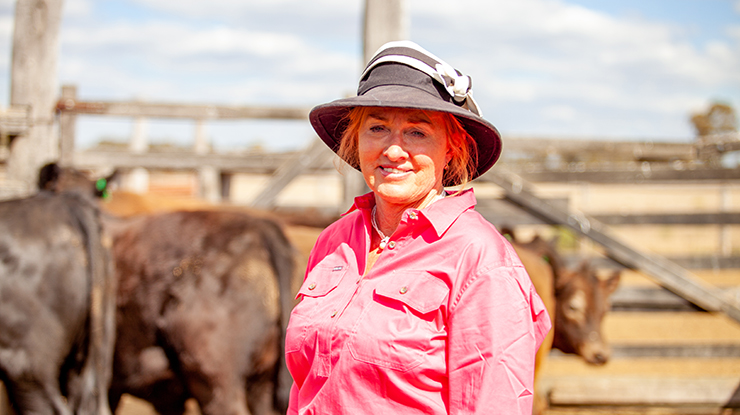 Kaylene Wonka, ‘Blue Poles’, Chinchilla
Kaylene Wonka, ‘Blue Poles’, Chinchilla
Kaylene claims another MSA win
Aiming for the market specifications required to achieve Meat Standards Australia (MSA) compliance is a motivating factor for Western Downs beef producer Kaylene Wonka in benchmarking her own business.
For Kaylene, ensuring her cattle meet MSA specifications informs many of her decisions at ‘Blue Poles’, Chinchilla, where she runs a 300-head breeding herd of Murray Grey-Angus cross cattle.
Achieving 100% compliance to MSA requirements throughout 2017-19, coupled with an average MSA Index of 61.07, has seen Kaylene awarded the 2019 MSA Excellence in Eating Quality Most Outstanding Beef Producer Award for Queensland for Band 2 producers. It’s the second time Kaylene has won the title, having previously won the Award in 2017.
Kaylene turns off approximately 100 head annually for the MSA program, targeting a dressed weight of over 250kg, sold directly to JBS Australia’s Dinmore processing plant, and up to 250kg dressed weight for local butchers.
Kaylene and her late husband, Darryl, became MSA registered producers in the early 2000s, a decision Kaylene says has benefited the business.
“When MSA was first introduced in 1998, Darryl and I thought it would be a good idea because it was a grading system for each individual animal,” Kaylene said.
“We were already guessing how each animal would dress out and we were interested in producing better beef. MSA allows us to gauge a better understanding of where our beef is at and make adjustments in our breeding herd to produce better carcase standards and eating qualities.
“Through MSA grading we recognised that the quality of our bulls needs to be higher, which means the standard of our calves are of better quality.
“MSA also allows us to get a higher price for our beef. Because of the MSA grading system, it allows us to turnoff a higher quality of carcases to our butchers. That high standard of beef means demand is strong.”
Kaylene said she has embraced the use of estimated breeding values (EBV) when selecting new Murray Grey and Angus bulls to boost herd genetics.
“I look at weight gains, carcase traits and fertility traits so I can breed cattle to manage the tougher conditions,” Kaylene said.
“Traits for low birth weight, early maturing and good P8 fat measurements are very important.
“Looking for early maturing bulls lets us mature our weaners at a younger age and finish them earlier. Buying bulls with excellent EBVs will improve the carcase quality of the calves they produce.
“Selecting quiet bulls with a good temperament to run with the herd helps with ensuring animals are quiet and have acceptable meat pH levels when they head to slaughter. Having quiet animals allows us to work around them a lot more efficiently and they don’t tend to stress as much as animals that react.
“I usually retain some heifers from select bulls, but I’ve also bought in in some Murray Grey, Angus and Limousin stud cows and plan to do some Artificial Insemination (AI) in the future.
“Keeping cows which produce a high quantity of milk ensures calves are getting the right nutrients from birth right through to weaning.
“We have had a soil test done, to tell us what nutrients our soil lacks, so we feed a molasses-based supplement along with the appropriate minerals to improve the health of our cattle, especially in dry times.”
With drought continuing to bite on the Western Downs, Kaylene said she’s been supplementary feeding her cattle to ensure the quality nutrition is necessary for MSA compliance.
“I wean all of the cattle in the yards. If I have pasture, I background the cattle on Leucaena, and Rhodes, Buffel and Bambatsi,” Kaylene said.
“We graze cattle on Leucaena because it’s a high-quality protein feed and its growth rate far outweighs grass, resulting in better growth rates in our weaners, then we grain assist to finish the cattle for market.”
In addition to focusing on nutrition and genetics, Kaylene said cattle handling is an important factor in reducing stress on her cattle and achieving MSA compliance.



